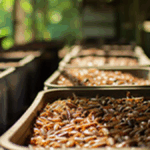
Agroecology in Practice : Techniques and Tips
6 March 2024
Acrididea Passe Au Turbo
4 November 2025Answers to Your Questions about Locust Farming
Locust farming, although practiced for centuries in some cultures, is still new to many. At Acrididea, we regularly receive questions about this fascinating aspect of sustainable agriculture. Here is a comprehensive guide to answering your most frequently asked questions about locust farming.
Q1. Why choose to farm locusts ? A : Locusts are an exceptionally sustainable and efficient source of protein. They require fewer resources such as water, food, and space compared to traditional livestock farming. Additionally, they emit fewer greenhouse gases and can be fed with agricultural by-products, thus reducing waste.
Q2. Are locusts safe to eat ? A : Absolutely. Locusts have been consumed in many cultures worldwide for millennia. When raised and processed correctly, they provide a safe and nutritious food source. At Acrididea, we follow strict protocols to ensure the safety and quality of our locust-based products.
Q3. What is the environmental impact of locust farming ? A : Locust farming has a significantly lower environmental impact than conventional livestock farming. They efficiently convert feed into protein, require less water and land, and their production results in fewer greenhouse gas emissions. This makes them a more sustainable option to meet the growing demand for protein.
Q4. How are locusts fed ? A : Locusts are omnivorous and can be fed a wide variety of foods. At Acrididea, we use organic and sustainable feed, including grains, fruits, and vegetables, as well as agricultural by-products that would otherwise go to waste. This contributes to a rich and balanced diet, enhancing the nutritional quality of the locusts.
Q5. Can locusts be farmed at home ? A : Yes, small-scale locust farming can be done at home with minimal equipment. This requires a box or container with adequate ventilation, a heat source to maintain a stable temperature, and appropriate feed. However, it's important to research and follow guidelines to ensure safe and healthy farming.
Q6. What are the challenges of locust farming ? A : Like any form of agriculture, locust farming has its challenges. This includes maintaining proper sanitary conditions, managing populations, and preventing diseases. Continuous research and innovation are essential to overcome these challenges and optimize farming.
Conclusion
A Promising Future for Locust Farming Locust farming offers a promising path towards a more sustainable and environmentally friendly food system. At Acrididea, we are committed to exploring this path and sharing our knowledge to encourage others to consider locusts as a viable food option. We hope this article has addressed some of your questions and inspired you to learn more about this innovative form of agriculture.


